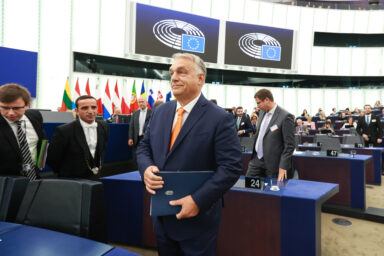Commission’s proposal for 2040 will probably include more flexibilities like higher proportion of international carbon credits from third countries. Rules for CO2 emissions from cars may be revised to make space for electric cars and also for alternative fuels. Details of the deal are to be published during Wednesday.
The meeting of the Council of Environment Ministers, whose main agenda was the debate on the EU’s emission targets for 2040, lasted from Tuesday until the early hours of Wednesday, 5 November. The preliminary results known so far contain significant changes to the European Commission’s original proposal. The most important of these is a higher proportion of so-called international carbon credits and (not yet confirmed) postponement of the ETS2 emissions trading system by twelve months to the beginning of 2028.
Not enough blocking minority
According to Reuters, a handful of countries including Czechia, Hungary, and Poland had indicated they would oppose the plan. However, they failed to build a blocking minority as the agreement, needs backing from at least 15 member states. “We believe we have the basis for a political deal,” Reuters cites a spokesperson for Denmark’s Council Presidency.
The weakened target would let countries buy foreign carbon credits to cover up to 5 per cent of the 90 per cent emissions-cutting goal, according to a draft of the EU deal, seen by Reuters. That would effectively weaken to 85 per cent the emissions cuts required from European industries, and ’pay’ foreign countries to cut emissions on Europe’s behalf to make up the rest.
The draft says the EU would also consider the option, in future, to let countries buy international carbon credits to meet a further 5 per cent of their 2040 emissions reductions—potentially shaving another 5 per cent off their domestic target.
You might be interested
The EU is racing to agree its new climate goal to avoid going empty-handed to the COP30 climate summit which will start on Monday, 10 November. European Commission President Ursula von der Leyen, however, will meet other world leaders already on 6 November.
Victory is ours: Czech Ministry
Some member states that were most opposed to the Commission’s original proposal are interpreting the provisional outcome of the negotiations as a victory.
“Czechia, along with other countries, managed to negotiate a series of concessions on the EU’s new climate target for 2040, with some countries eventually backing the final text,” Czech Environment Minister Petr Hladik wrote on X in the morning.
In early July, the European Commission proposed a 90 percent reduction in carbon dioxide emissions by 2040 compared to 1990. Some countries, such as Czechia, Poland and Italy, pushed for a softening of the 90 percent climate target, but Spain and Sweden rejected it. Poland, for example, wanted 10 percent of the 90 percent target to be achieved by buying international carbon credits.










